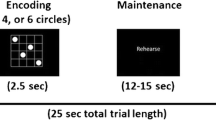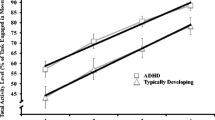Abstract
Computerized working memory and executive function training programs designed to target specific impairments in executive functioning are becoming increasingly available, yet how well these programs generalize to improve functional deficits in disorders, such as attention-deficit/hyperactivity disorder (ADHD), beyond the training context is not well-established. The aim of this study was to examine the extent to which working memory (WM) training in children with ADHD would diminish a core dysfunctional behavior associated with the disorder, “off-task” behavior during academic task performance. The effect of computerized WM training (adaptive) was compared to a placebo condition (nonadaptive) in a randomized, double-blind, placebo-controlled design in 26 children (18 males; age, 7 to 14 years old) diagnosed with ADHD. Participants completed the training in approximately 25 sessions. The Restricted Academic Situations Task (RAST) observational system was used to assess aspects of off-task behavior during the completion of an academic task. Traditional measures of ADHD symptoms (Conners’ Parent Rating Scale) and WM ability (standardized WM tests) were also collected. WM training led to significant reductions in off-task ADHD-associated behavior on the RAST system and improvement on WM tests. There were no significant differences between groups in improvement on parent rating scales. Findings lend insight into the generalizability of the effects of WM training and the relation between deficits in WM and off-task behavioral components of ADHD. These preliminary data suggest WM training may provide a mechanism for indirectly altering academic performance in children with ADHD.


Similar content being viewed by others
References
Chronis AM, Jones HA, Raggi VL. Evidence-based psychosocial treatments for children and adolescents with attention-deficit/hyperactivity disorder. Clin Psychol Rev 2006;26:486–502.
Pelham WE Jr., Wheeler T, Chronis A. Empirically supported psychosocial treatments for attention deficit hyperactivity disorder. J Clin Child Psychol 1998;27:190–205.
Anastopoulos AD, Guevremont D, Shelton T, DuPaul GJ. Parenting stress among families of children with attention deficit hyperactivity disorder. J Abnorm Child Psychol 1992;20:503–520.
Abikoff H. ADHD psychosocial treatments: generalization reconsidered. J Atten Disord 2009;13:207–210.
Hale TS, Bookheimer S, McGough JJ, Phillips JM, McCracken JT. Atypical brain activation during simple & complex levels of processing in adult ADHD: an fMRI study. J Atten Disord 2007;11:125–140.
Krauel K, Duzel E, Hinrichs H, Santel S, Rellum T, Baving L. Impact of emotional salience on episodic memory in attention-deficit/hyperactivity disorder: a functional magnetic resonance imaging study. Biol Psychiatry 2007;61:1370–1379.
Schweitzer JB, Faber TL, Grafton ST, Tune LE, Hoffman JM, Kilts CD. Alterations in the functional anatomy of working memory in adult attention deficit hyperactivity disorder. Am J Psychiatry 2000;157:278–280.
Sheridan MA, Hinshaw S, D'Esposito M. Efficiency of the prefrontal cortex during working memory in attention-deficit/hyperactivity disorder. J Am Acad Child Adolesc Psychiatry 2007;46:1357–1366.
Fassbender C, Schweitzer JB. Is there evidence for neural compensation in attention deficit hyperactivity disorder? A review of the functional neuroimaging literature. Clin Psychol Rev 2006;26:445–465.
Burgess GC, Depue BE, Ruzic L, Willcutt EG, Du YP, Banich MT. Attentional control activation relates to working memory in attention-deficit/hyperactivity disorder. Biol Psychiatry 2010;67:632–640.
McNab F, Varrone A, Farde L, et al. Changes in cortical dopamine D1 receptor binding associated with cognitive training. Science (New York) 2009;323:800–802.
Baddeley A. The fractionation of working memory. Proc Natl Acad Sci 1996;26:13468–13472.
Alloway TP, Gathercole SE, Elliott J. Examining the link between working memory behaviour and academic attainment in children with ADHD. Dev Med Child Neurol 2010;52:632–636.
Barkley RA. Attention Deficit hyperactivity disorder: a handbook for diagnosis and treatment, 3rd ed. New York: Guilford Press, 2006.
Gropper RJ, Tannock R. A pilot study of working memory and academic achievement in college students with ADHD. J Atten Disord 2009;12:574–581.
McLean A, Dowson J, Toone B, et al. Characteristic neurocognitive profile associated with adult attention-deficit/hyperactivity disorder. Psychol Med 2004;34:681–692.
Karatekin C, Asarnow RF. Working memory in childhood-onset schizophrenia and attention-deficit/hyperactivity disorder. Psychiatry Res 1998;80:165–176.
Kempton S, Vance A, Maruff P, Luk E, Costin J, Pantelis C. Executive function and attention deficit hyperactivity disorder: stimulant medication and better executive function performance in children. Psychol Med 1999;29:527–538.
Kuntsi J, Oosterlaan J, Stevenson J. Psychological mechanisms in hyperactivity: I. Response inhibition deficit, working memory impairment, delay aversion, or something else? J Child Psychol Psychiatry 2001;42:199–210.
Mariani M, Barkley R. Neuropsychological and academic functioning in preschool boys with attention deficit hyperactivity disorder. Dev Neuropsychol 1997;13:111–129.
Martinussen R, Hayden J, Hogg-Johnson S, Tannock R. A meta-analysis of working memory impairments in children with attention-deficit/hyperactivity disorder. J Am Acad Child Adolesc Psychiatry 2005;44:377–384.
Rapport MD, Bolden J, Kofler MJ, Sarver DE, Raiker JS, Alderson RM. Hyperactivity in boys with attention-deficit/ hyperactivity disorder (ADHD): a ubiquitous core symptom or manifestation of working memory deficits? J Abnorm Child Psychol 2009;37: 521–534.
Schweitzer JB, Hanford RB, Medoff DR. Working memory deficits in adults with ADHD: is there evidence for subtype differences? Behav Brain Funct 2006;2:43.
Willcutt EG, Doyle AE, Nigg JT, Faraone SV, Pennington BF. Validity of the executive function theory of attention-deficit/hyperactivity disorder: a meta-analytic review. Biol Psychiatry 2005;57:1336–1346.
Aronen ET, Vuontela V, Steenari MR, Salmi J, Carlson S. Working memory, psychiatric symptoms, and academic performance at school. Neurobiol Learn Mem 2005;83:33–42.
Gathercole SE, Pickering SJ. Working memory deficits in children with low achievements in the national curriculum at 7 years of age. Br J Educ Psychol 2000;70(part 2):177–194.
Rapport MD, Scanlan SW, Denney CB. Attention-deficit/hyperactivity disorder and scholastic achievement: a model of dual developmental pathways. J Child Psychol Psychiatry 1999;40:1169–1183.
Jarvis HL, Gathercole SE. Verbal and non-verbal working memory and achievements on national curriculum tests at 11 and 14 years of age. Educational and Child Psychology 2003;20:123–140.
Biederman J, Petty CR, Ball SW, et al. Are cognitive deficits in attention deficit/hyperactivity disorder related to the course of the disorder? A prospective controlled follow-up study of grown up boys with persistent and remitting course. Psychiatry Res 2009;170:177–182.
Kremen WS, Jacobsen KC, Xian H, et al. Genetics of verbal working memory processes: a twin study of middle-aged men. Neuropsychology 2007;21:569–580.
Holmes J, Gathercole SE, Dunning DL. Adaptive training leads to sustained enhancement of poor working memory in children. Dev Sci 2009;12:F9-F15.
Klingberg T, Forssberg H, Westerberg H. Training of working memory in children with ADHD. J Clin Exp Neuropsychol 2002;24:781–791.
Klingberg T, Fernell E, Olesen PJ, et al. Computerized training of working memory in children with ADHD--a randomized, controlled trial. J Am Acad Child and Adolesc Psychiatry 2005;44:177–186.
Kurtz MM, Seltzer JC, Fujimoto M, Shagan DS, Wexler BE. Predictors of change in life skills in schizophrenia after cognitive remediation. Schizophr Res 2009;107:267–274.
Olesen PJ, Westerberg H, Klingberg T. Increased prefrontal and parietal activity after training of working memory. Nat Neurosci 2004;7:75–79.
Klingberg T. Training and plasticity of working memory. Trends Cogn Sci [Review]. 2010;14:317–324.
Holmes J, Gathercole SE, Place M, Dunning DL, Hilton KL, Elliott JG. Working memory deficits can be overcome: impacts of training and medication on working memory in children with ADHD. Appl Cogn Psychol 2010;24:827–836.
Beck SJ, Hanson CA, Puffenberger SS, Benninger KL, Benninger WB. A controlled trial of working memory training for children and adolescents with ADHD. J Clin Child Adolesc Psychol 2010;39:825–836.
Schweitzer JB, Lee DO, Hanford RB, et al. Effect of methylphenidate on executive functioning in adults with attention-deficit/hyperactivity disorder: normalization of behavior but not related brain activity. Biol Psychiatry 2004;56:597–606.
Fassbender C, Schweitzer JB, Cortes CR, et al. Working memory in attention deficit/hyperactivity disorder is characterized by a lack of specialization of brain function. PloS One 2011;6:e27240.
Westerberg H, Klingberg T. Changes in cortical activity after training of working memory — a single-subject analysis. Physiol Behav 2007;92:186–192.
Olson IR, Berryhill M. Some surprising findings on the involvement of the parietal lobe in human memory. Neurobiol Learn Mem 2009;91:155–165.
Wager T, Smith E. Neuroimaging studies of working memory: a meta-analysis. Cogn Affect Behav Neurosci 2003;3:255–274.
Hoekzema E, Carmona S, Tremols V, et al. Enhanced neural activity in frontal and cerebellar circuits after cognitive training in children with attention-deficit/hyperactivity disorder. Hum Brain Map 2010;31:1942–1950.
Volkow ND, Wang GJ, Newcorn J, et al. Depressed dopamine activity in caudate and preliminary evidence of limbic involvement in adults with attention-deficit/hyperactivity disorder. Arch Gen Psychiatry 2007;64:932–940.
Milich R, Loney J, Landau S. Independent dimensions of hyperactivity and aggression: a validation with playroom observation data. J Abnorm Psychol 1982;91:183–198.
Milich R, Loney J, Roberts MA. Playroom observations of activity level and sustained attention: two-year stability. J Consult Clin Psychol 1986;54:272–274.
Roberts MA. A behavioral observation method for differentiating hyperactive and aggressive boys. J Abnorm Child Psychol 1990;18:131–142.
Loney J, Carlson GA, Salisbury H, Volpe RJ. Validation of three dimensions of childhood psychopathology in young clinic-referred boys. J Atten Disord 2005;8:169–181.
Breen MJ. Cognitive and behavioral differences in AdHD boys and girls. J Child Psychol Psychiatry 1989;30:711–716.
Schweitzer JB, Sulzer-Azaroff B. Self-control in boys with attention deficit hyperactivity disorder: effects of added stimulation and time. J Child Psychol Psychiatry 1995;36:671–686.
Breslau J, Miller E, Breslau N, Bohnert K, Lucia V, Schweitzer J. The impact of early behavior disturbances on academic achievement in high school. Pediatrics 2009;123:1472–1476.
Raggi VL, Chronis AM. Interventions to address the academic impairment of children and adolescents with ADHD. Clin Child Fam Psychol Rev 2006;9:85–111.
Hinshaw SP. Academic underachievement, attention deficits, and aggression: comorbidity and implications for intervention. J Consult Clin Psychol 1992;60:893–903.
Barkley RA, Fischer M, Smallish L, Fletcher K. Young adult outcome of hyperactive children: adaptive functioning in major life activities. J Am Acad Child and Adolesc Psychiatry 2006;45:192–202.
Polderman TJ, Boomsma DI, Bartels M, Verhulst FC, Huizink AC. A systematic review of prospective studies on attention problems and academic achievement. Acta psychiatrica Scandinavica 2010;122:271–284.
Breslau J, Miller E, Joanie Chung WJ, Schweitzer JB. Childhood and adolescent onset psychiatric disorders, substance use, and failure to graduate high school on time. J Psychiatr Res 2011;45:295–301.
World Medical Association. Declaration of Helsinki, Finland, 2008.
Barkley RA. Attention deficit hyperactivity disorder: a handbook for diagnosis and treatment. New York: The Guilford Press, 1990.
Barkley RA, McMurray MB, Edelbrock CS, Robbins K. The response of aggressive and nonaggressive ADHD children to two doses of methylphenidate. J Am Acad Child Adolesc Psychiatry 1989;28:873–881.
Zeger SL, Liang KY. Longitudinal data analysis for discrete and continuous outcomes. Biometrics 1986;42:121–130.
Volkow ND, Wang GJ, Fowler JS, et al. Dopamine transporter occupancies in the human brain induced by therapeutic doses of oral methylphenidate. Am J Psychiatry 1998;155:1325–1331.
Volkow ND, Wang GJ, Kollins SH, et al. Evaluating dopamine reward pathway in ADHD: clinical implications. JAMA 2009;302:1084–1091.
Johansen EB, Killeen PR, Russell VA, et al. Origins of altered reinforcement effects in ADHD. Behav Brain Funct 2009;5:7.
Waltz JA, Schweitzer JB, Gold JM, et al. Patients with schizophrenia have a reduced neural response to both unpredictable and predictable primary reinforcers. Neuropsychopharmacology 2009;34:1567–1577.
Swanson J. Compliance with stimulants for attention-deficit/hyperactivity disorder: issues and approaches for improvement. CNS Drugs 2003;17:117–131.
Weiss MD, Gadow K, Wasdell MB. Effectiveness outcomes in attention-deficit/hyperactivity disorder. J Clin Psychiatry 2006;67(suppl 8):38–45.
Acknowledgments
We would like to thank the families for their participation, Joan Gunther, Psy.D., Gary Ho, M.A., Danielle Mizuiri, B.S., Tseng-Mei Yip, B.S., Christina Blake, B.S., and Kyle Rutledge for their assistance, and Cogmed for providing us with the software licenses at no cost. We have no financial disclosures. We declare that there is no real or perceived conflict of interest for the authors. Full conflict of interest disclosures are available in the electronic supplementary material for this article.
Required Author Forms
Disclosure forms provided by the authors are available with the online version of this article.
Author information
Authors and Affiliations
Corresponding author
Electronic supplementary material
Below is the link to the electronic supplementary material.
ESM 1
(PDF 516 kb)
Rights and permissions
About this article
Cite this article
Green, C.T., Long, D.L., Green, D. et al. Will Working Memory Training Generalize to Improve Off-Task Behavior in Children with Attention-Deficit/Hyperactivity Disorder?. Neurotherapeutics 9, 639–648 (2012). https://doi.org/10.1007/s13311-012-0124-y
Published:
Issue Date:
DOI: https://doi.org/10.1007/s13311-012-0124-y




